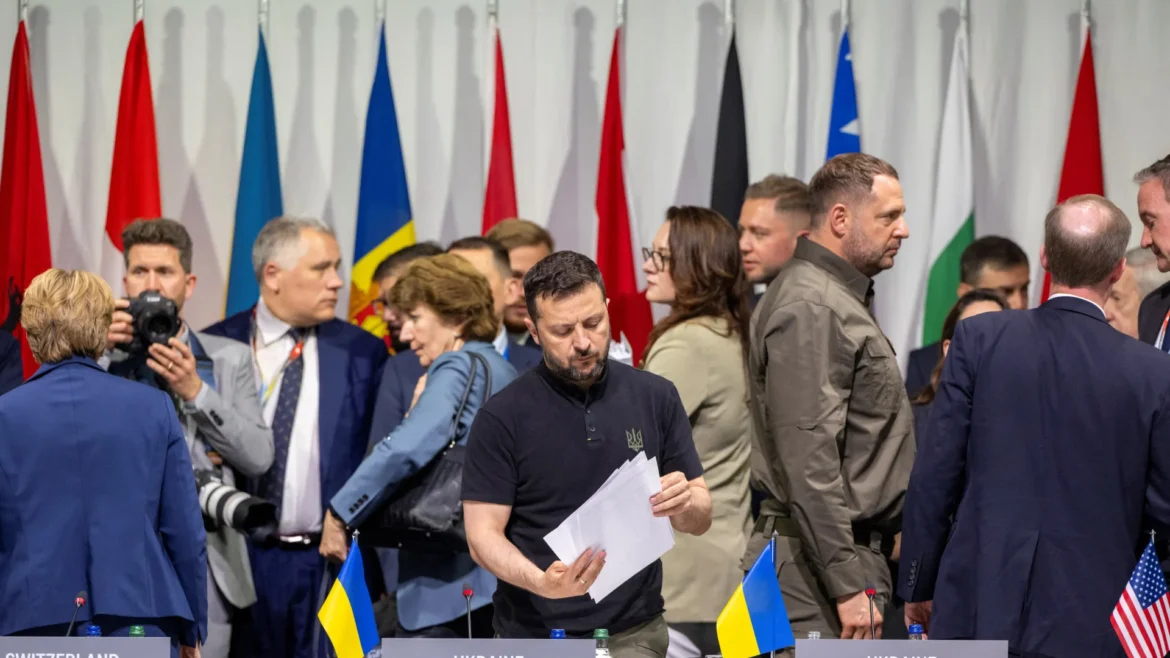The Global South is not buying the Ukrainian claim to colonial victimhood, and has grown more suspicious of US client states after Gaza.
The main aim of the much talked about Ukraine Peace Summit, held in Switzerland on June 15-16, was to rally the Global Majority behind President Volodymyr Zelenskyy’s “peace formula” – a marketable brand name for a list of demands that include Russia’s withdrawal from Ukraine’s entire territory and the formation of an international tribunal to try Putin’s government for war crimes. Of course, realistically, such an absolutist settlement can only be secured through a total victory on the battlefield, which does not appear to be forthcoming. Nonetheless, getting most of the global community to publicly support these demands would have undoubtedly strengthened Zelenskyy’s hand against Putin.
In the end, the only outcome of this perplexing event, which attempted to resolve an armed conflict without the involvement of the side that started it, was the death of the very “peace formula” it strove to promote.
The communique signed by 81 participants at the summit doesn’t even begin to outline the contours of a possible settlement. It only covers three important but secondary issues – Ukraine’s grain export, the safety of nuclear power stations and the return of war prisoners and Ukrainian children removed by the Russians from the warzone into Russia.
But even so, key players like Brazil, India and Saudi Arabia avoided signing it, arguing that a forum aiming to achieve peace with Russia makes little sense in Russia’s absence. China flatly refused to participate. Tellingly, even US President Joe Biden chose not to throw his weight behind the forum. Rather than making the trip to Switzerland himself, he sent Vice President Kamala Harris to represent his administration.
It’s not entirely Ukraine’s fault that it failed to secure the support of the Global South for its war aims at this summit. The Global Majority’s cold-shouldering of the summit reflects the ongoing decline of America’s global influence, which accelerated significantly in the past eight months in light of the humanitarian catastrophe in Gaza and President Biden’s continued backing of Israel in the face of it. Whether Kyiv likes it or not, anyone who is seen as America’s client state is going to be approached with a great deal of skepsis.
There is also the separate case of China, which, according to its own government officials, feels goaded by the United States into an armed conflict over Taiwan. Getting Beijing on board at an event squarely designed as anti-Russian has always been a fool’s errand. Why amid growing tensions in relations with the US would China turn hostile towards its most valuable global ally, Russia?
Ukraine’s own rhetoric, however, has also contributed to the failure. Back in 2022, after the start of Russia’s full-out aggression, Zelenskyy and members of his government attempted to secure sympathy of the Global South by presenting Ukraine as a victim of a colonial war waged by Russia.
At best, this argument falls on flat ears in places like South Africa or Brazil, coming from a European nation that pictures itself as a bulwark of “the civilised world” – a term President Zelenskyy once again unwittingly used at a security conference in Singapore in early June as he tried to persuade Asian countries to attend the summit. The real former victims of European colonialism hardly enjoy being deemed as “uncivilised”.
Global South leaders don’t even need to know that Ukrainian nobility and clerics, like archbishop Feofan Prokopovych, served as ideologues of the Russian imperial project when it was implemented by Peter the Great. Or that much of what we know as Ukraine’s southeast, specifically the territories where the war is raging today, was colonised as a result of Russian imperial expansion in the 18th century, in which Ukrainians played no small role.
While it is undoubtedly a victim of Russian irredentism and ultra-nationalism in its brutal Putinist form, the Ukrainian claim to colonial victimhood sounds as valid to people in Soweto or Salvador de Bahia as that of the Scots. It is just a rhetorical trick coined by its own far right. The fact that neo-Nazi and white supremacist groups which took part in Ukraine’s Maidan revolution have now grown to the size of large army units, such as the 3rd Detached Assault Brigade (one of the Azov Movement’s outfits), doesn’t help either.


